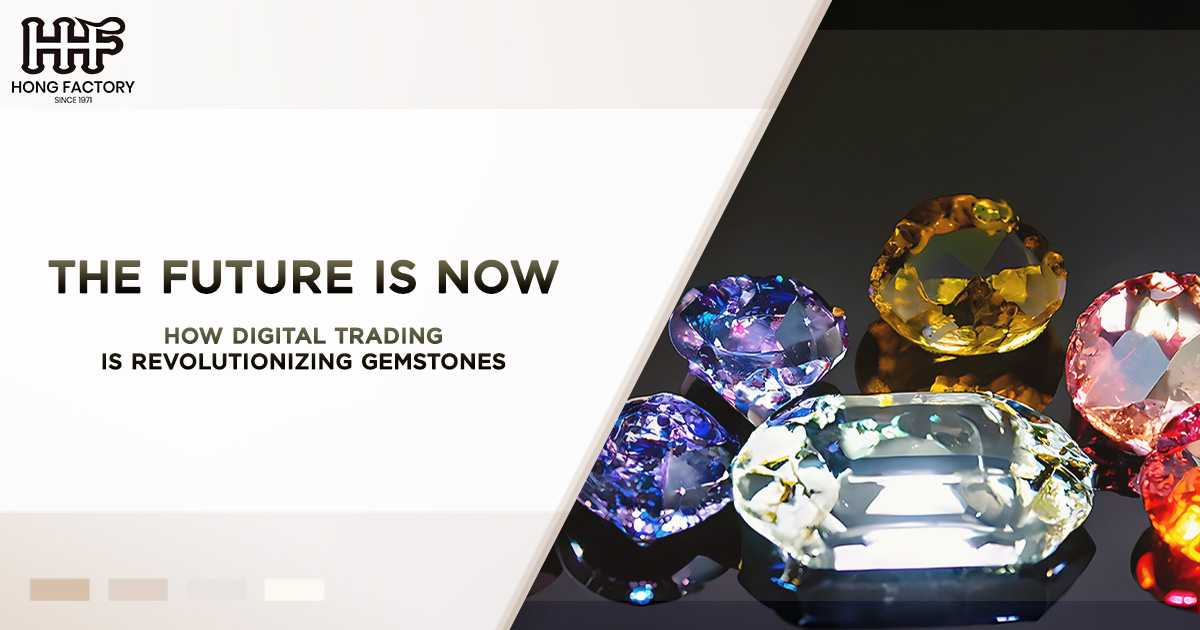The world of gemstones has always been synonymous with tradition, exclusivity, and luxury. For centuries, gem trading relied on physical exchanges in high-security environments, exclusive auctions, and personal networks. However, the industry is undergoing a seismic transformation, thanks to advancements in technology and the rise of digital trading platforms. Today, the gemstone industry is embracing new technologies like blockchain certification, digital marketplaces, and enhanced security measures—ushering in a new era of transparency, accessibility, and global reach. This article explores how modern trading platforms, robust security protocols, and increased market accessibility are changing the game, making the online gem trade a thriving and revolutionary force.
Modern Trading Platforms: Redefining the Gemstone Market
In the past, gemstone trading was heavily reliant on physical showrooms, trade fairs, and personal relationships between buyers and sellers. While this traditional approach fostered exclusivity, it also created barriers to entry for new buyers, limited access to global markets, and perpetuated opacity in pricing and quality standards. Enter modern trading platforms, which have completely disrupted the status quo.
The Rise of the Online Gem Trade
Digital trading platforms have transformed the gemstone industry, offering buyers and sellers a global marketplace where transactions happen online, in real-time. These platforms enable users to browse a vast array of gemstones, compare prices, and make purchases with a few clicks. Online marketplaces, such as Gemfields’ online auctions and platforms like Gem Rock Auctions and 1stdibs, have democratized access to gemstones by providing a digital storefront for individual traders and large corporations alike.
The online gem trade is no longer a niche market; it’s a booming sector attracting investors, collectors, and enthusiasts from all corners of the globe. By eliminating geographic barriers, these platforms create opportunities for small-scale miners and independent jewelers to reach international buyers, while offering consumers access to a diverse, high-quality inventory.
AI-Powered Tools
Modern trading platforms are also leveraging artificial intelligence (AI) to enhance the customer experience. AI algorithms analyze a gemstone’s characteristics, including cut, color, clarity, and carat weight, to provide accurate pricing and grading information. This technology reduces the risk of inconsistencies that often plague subjective human evaluation, offering buyers greater confidence in their purchases.
Moreover, AI tools can recommend gemstones tailored to specific buyer preferences, ensuring a more personalized shopping experience. These innovations are not just making trading more efficient but are also fostering trust in the online gem trade.
Blockchain Certification – Ensuring Transparency and Trust
One of the most significant challenges in the gemstone industry has been the lack of transparency in sourcing, certification, and pricing. Counterfeit gemstones, misrepresented origins, and unethical mining practices have long plagued the market. However, blockchain technology is emerging as a game-changer, addressing these issues with unparalleled transparency and security.
How Blockchain Works in the Gemstone Industry
Blockchain is a decentralized digital ledger that records transactions across multiple computers in a way that is secure, transparent, and tamper-proof. When applied to the gemstone industry, blockchain certification ensures that every gemstone’s journey—from mine to market—is documented and verifiable.
For instance, when a gemstone is mined, its details—such as origin, weight, and quality—are recorded on the blockchain. As the stone moves through the supply chain, every transaction is logged, creating an immutable record. Buyers can access this information to verify the gemstone’s authenticity, ethical sourcing, and compliance with industry standards.
Building Consumer Confidence
Blockchain certification has become a cornerstone of the digital gemstone market, especially as consumers become more concerned about ethical sourcing and environmental sustainability. Buyers want assurance that their gemstones are conflict-free and mined responsibly. Blockchain provides this transparency, giving consumers peace of mind and encouraging more ethical practices within the industry.
Companies like Everledger and Gübelin Gem Lab have pioneered blockchain solutions for the gemstone trade, helping to build trust and credibility in the market. By eliminating fraud and ensuring provenance, blockchain is leveling the playing field for all stakeholders.
Security Measures in Digital Markets
While the shift to digital trading platforms has opened up exciting new opportunities, it has also introduced unique challenges—chief among them being security. The gemstone industry deals with high-value assets, making it a prime target for fraud, cyberattacks, and theft. Fortunately, advancements in cybersecurity and secure transaction methods are mitigating these risks.
Multi-Layered Security Protocols
Leading digital marketplaces are adopting multi-layered security protocols to protect both buyers and sellers. These measures include biometric authentication, two-factor verification, and end-to-end encryption, ensuring that sensitive data is kept secure. Additionally, platforms are employing machine learning algorithms to detect and prevent fraudulent activity in real-time.
For example, some platforms use AI-driven fraud detection systems to flag suspicious transactions or listings, safeguarding users against scams. Escrow services are also becoming a standard feature in the online gem trade, ensuring that funds are only released to sellers once buyers confirm the authenticity and quality of the purchased gemstones.
Tokenization of Assets
Another innovative security measure is the tokenization of gemstones. Tokenization involves converting a gemstone’s value into a digital token that can be traded on blockchain platforms. These tokens are backed by the physical gemstone, which is stored in a secure vault. Tokenization not only enhances security but also allows for fractional ownership, enabling investors to purchase shares of high-value gemstones—a concept that was previously unimaginable.

Market Accessibility – A Global Opportunity
The digital revolution in gemstones isn’t just about technology; it’s about creating a more inclusive and accessible market. By breaking down traditional barriers, digital platforms are empowering a new generation of buyers and sellers.
Reaching New Audiences
Historically, the gemstone market catered to a niche group of affluent collectors and investors. Today, digital platforms are expanding the audience by making gemstones accessible to a broader demographic. Affordable gemstones and flexible payment options allow first-time buyers to enter the market with ease.
Moreover, the online gem trade appeals to younger, tech-savvy consumers who value convenience and transparency. Social media integration and influencer partnerships further drive engagement, making gemstones a desirable asset for millennials and Gen Z buyers.
Supporting Artisanal Miners
Digital platforms are also providing a lifeline to artisanal miners and small-scale producers. By connecting them directly with buyers, these platforms eliminate intermediaries, ensuring that miners receive fair prices for their gemstones. This not only boosts local economies but also promotes sustainable development in mining communities.
Additionally, crowdfunding initiatives on digital market places allow buyers to invest directly in mining projects, fostering a sense of shared ownership and responsibility for the industry’s future.
Conclusion The Future of Gemstone Trading
The digital transformation of the gemstone industry is nothing short of revolutionary. Modern trading platforms are making the online gem trade more efficient, accessible, and transparent. Blockchain certification is addressing long-standing issues of fraud and unethical sourcing, while advanced security measures are safeguarding high-value transactions.
Perhaps most importantly, the digital revolution is democratizing the gemstone market, opening it up to new audiences and empowering stakeholders across the supply chain. As technology continues to evolve, the possibilities for the gemstone industry are limitless.
The future is now, and the gemstone industry is embracing it with open arms. Whether you’re a seasoned collector, a first-time buyer, or an artisanal miner, the digital marketplace offers unprecedented opportunities to explore, trade, and invest in one of nature’s most beautiful creations. The sparkle of gemstones is no longer confined to exclusive showrooms—it’s now just a click away.
